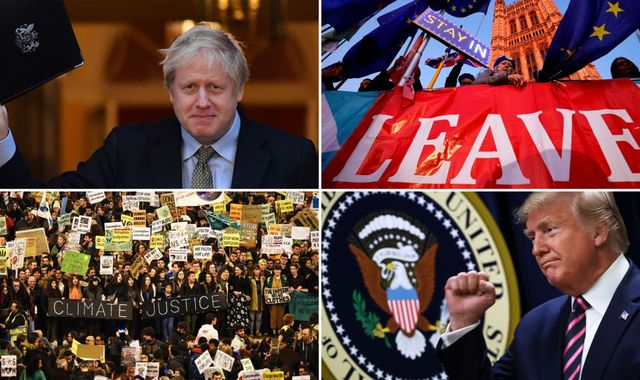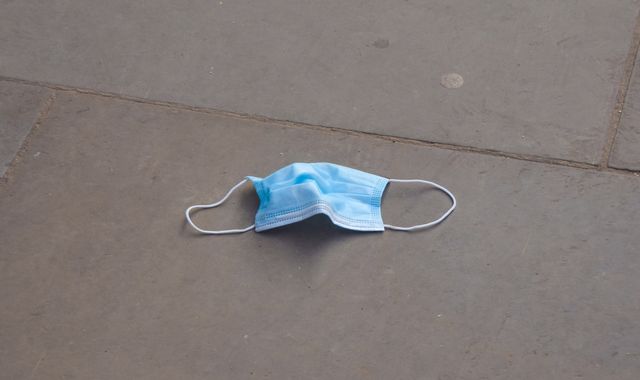2020 in politics: Adam Boulton’s guide on what to look for
Written by News on 28/12/2019
As 2019 comes to an end and we recover from the rigours of Brexit debate and an election, what does the coming year have in store?


JANUARY
Boris Johnson gets Brexit done. Britain will cease to be a member of the European Union at midnight (European Time) on 31 January regardless of whether MPs are successful in ordering Big Ben to chime us out.
Whatever happens in further negotiations on the future relationship between the UK and European states, this is the point of no return. There will be no possibility of the UK becoming a member again on the same terms.
If there are no further delays, the US Senate will put US President Donald Trump on trial for high crimes and misdemeanours following his impeachment by the House of Representatives. As things stand, he will not be convicted.
There are not many major elections scheduled in 2020 – Israel, Taiwan and the USA top the list.
The US presidential campaign gets real with the Iowa caucuses and New Hampshire primary. These will be fun and should cut down the field. But they won’t tell us much about the eventual winner.
As incumbent, Mr Trump will have a walkover for the Republicans. As for the Democrats these are red states choosing blue runners – not very representative.
FEBRUARY
The words “Brexit”, “Leaver” and “Remainer” go on the prime minister’s banned list.
Chancellor Sajid Javid will have the chance to present a Budget at last. We don’t know the exact date but this is likely to be a moment to spell out how those election promises are really going to be paid for.
It is widely expected that this will be Mr Javid’s first and last Budget. He is likely to be moved on in the major post-Brexit government reshuffle Mr Johnson is planning for the spring.
A re-arrangement of government departments and a cut in the number of cabinet ministers are likely, masterminded by Number 10 adviser Dominic Cummings.
At the start of the month the first post-Brexit Rugby Six Nations begins. The first matches are Wales v Italy, Ireland v Scotland and France v England.
MARCH
Bye bye Jeremy. The Labour Party is due to elect a new leader as Jeremy Corbyn steps down after two general election defeats.
It’s an open race. There is a big difference between party activists and the general public as to who would make the most appealing leader.
Super Tuesday in the US is on 3 March. Fourteen states including California, Texas and Massachusetts are holding primaries to choose presidential nominees.
This bigger-than-ever election day might be the decisive moment in selecting the Democratic candidate. Former New York City mayor and billionaire Michael Bloomberg will only enter the Democrat race officially at this point.
APRIL
The government’s ban on plastic straws comes into force in England. Currently we dispose of 5 billion plastic straws, 300 million stirrers and two billion plastic shafted cotton buds each year.
MAY
Local elections on 7 May. Given that former mayor of London Mr Johnson is now prime minister all eyes will be on Sadiq Khan’s battle for re-election.
Victory would make him a real contender as a future leader of a troubled Labour Party. Could a surprise surge by independent Rory Stewart rain on his parade?
Labour’s Andy Burnham in Manchester, and Tory ex-John Lewis boss Andy Street in the West Midlands are also up for re-election, along with five other mayoral contests, 40 police and crime commissioners, and 118 English councils.
JUNE
The month-long UEFA European Football Championship kicks off on 12 June. England and Wales qualified to play, as did Spain, France, Russia, Italy, Poland, Ukraine, Turkey, Belgium, Czech Republic, Finland, Sweden, Croatia, Denmark, Austria, Netherlands, Germany, Portugal and Switzerland.
In a new experiment to mark UEFAs 60th anniversary, 12 nations are hosting games. The final and semi-finals will take place at Wembley Stadium in July.
JULY
This is the EU’s deadline for the UK to seek an extension to the “transition period” beyond the end of the year. Mr Johnson is writing into UK law that there will be no extension.
The Democratic Convention in the swing state of Wisconsin will be the moment of truth for the party to choose their candidate and their running mate for vice president.
By the end of the month much of the world’s attention will be tuned into the Olympics which begin in Japan on 24 July.
AUGUST
More Olympics. Following the doping ban, will Russian athletes compete under neutral flags?
The Republicans have left their national convention late in the hope that it will be a re-coronation of Mr Trump.
If so, the biggest excitement will be whether he dumps vice president Mike Pence – so far he says he won’t. If Mr Trump has fallen by the wayside by then, expect a real dog fight in Charlotte, North Carolina (another swing state).
SEPTEMBER
The Liberal Democrat and Labour Party Conferences won’t be happy events after the kickings both received in the last election. Expect continued rumblings over party leadership.
After Labor Day (7 September) what the Americans call their general election begins. The first presidential debate is already scheduled for 29 September in Indiana.
OCTOBER
The Conservative Party Conference in Birmingham. Then back to work in Westminster. By now, the first fruits should be starting to appear from the government reviews into constitutional reform and foreign and defence policy.
There will be two more US presidential debates in Indiana and Michigan and the sole vice presidential debate is scheduled in Utah. They organise these things better over there.
NOVEMBER
The first Tuesday of the month, 3 November, is US election day. Contests take place from the presidency, through a third of the Senate and all of the House of Representatives, all the way to local state officials. America’s choices will be consequential for the rest of the world.
Immediately after the US election, climate change will top the international agenda as the UK hosts the COP 26 Summit in Glasgow. COP stands for Conference Of Parties to the UN Framework Convention on Climate Change.
Some 30,000 delegates from around the world are due to attend to test past performance and hammer out new commitments on carbon emissions. It will be a big test for the former Conservative MP and minister Claire Perry who is COP 26 president.
DECEMBER
This month marks the first anniversary of Mr Johnson’s election victory and we are back to where we began.
If the government has its way the UK will throw off the last shackles of the EU on New Year’s Eve and payments to the union will cease.
But what agreements for future relationships, especially on trade, will be in place? Will the UK avoid what some here call “a clean break”, while others fear “crashing out” over a “cliff edge”?
(c) Sky News 2019: 2020 in politics: Adam Boulton’s guide on what to look for







